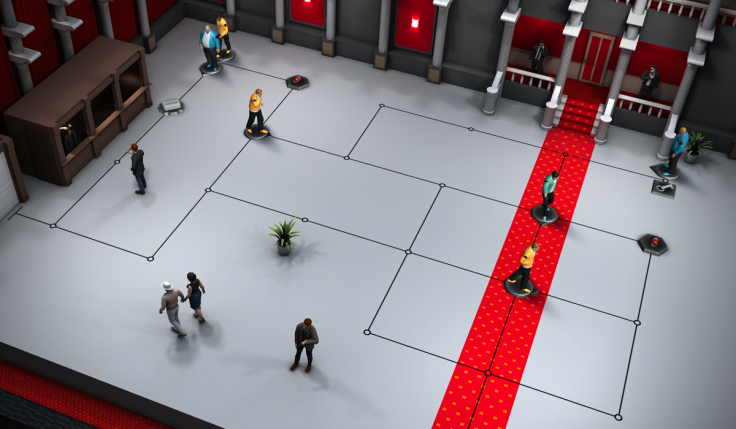Hitman Go represents assassination series at its most cold and calculating

"Linear" is a dirty word in gaming. A good game, apparently, is one that lets the player experiment and effectuate, and doesn't handhold with rules and restrictions. You can't "play" if there are too many confines. You can't be yourself and act like yourself (which for some reason we've decided is what we always ought to be able to do in games) if you're constantly having your actions curtailed. Options are good. Space is good. Interpretation is king.
Hitman Go ignores these standards and is a better game – and character study – for it. Visually stripped bare and mechanically about as simple as video games come, it's differentiated from its AAA console cousins by the removal of choice: unlike the bigger Hitman games, there is only ever one truly right way to complete each of Go's levels.
It's linear to the extreme. You can only move in certain ways. You can only perform actions, like shooting, at designated times. The player's path is even drawn on the ground, using straight lines. In Hitman Go you must play and behave a certain way. Arguably, it's ham-fisted. But as part of the discussion about what matters more, the player's choice or the game-maker's ideas and writing, Hitman Go makes a convincing case for the latter.
Rarely have I played a game so dedicated to its central character. Hitman Go's linearity, its sparseness, its brevity, are all reflections of protagonist Agent 47's personality and world view. Here's a game that, with utter disregard for not just general video game standards, but people's expectations of the Hitman series, puts character and consistency ahead of mechanical complexity and breadth of experience.

Go's levels present the world as seen through 47's eyes. People are not people, they are game pieces. Buildings are not buildings, they are a board, a stage. A superlative assassin, with the ability to infiltrate even the most closely guarded areas and eliminate his target, 47 seems to possess a supernatural ability for predicting guard behaviour and staying out of sight.
In Go, that is represented by those aforementioned lines on the ground – like 47, we, the player, can see where guards will move to and how we can move to stay out of their way. And if we kill one, he is merely a piece removed from the board. As an assassin, who kills people unfeelingly and as a job, we treat murder in Hitman Go not as murder, but as simplifying our task.
One of the central failings of the other Hitman games, at least in regards to character, is they encourage experimentation. For every right and effective way to complete a level, there are a dozen messy, goofy methods. To an extent it's "good" game design. One of the main pleasures of Hitman is toying with the environments and seeing with how much idiosyncrasy you can execute a hit.
But 47 himself is supposed to be cold, calculating and ruthlessly successful. Even his appearance, blue-eyed, hairless, immaculately dressed, suggests efficiency and sophistication – spending hours conniving the perfect hit might make for a fuller game but it doesn't reflect the cold pragmatism that 47, as a character, is supposed to possess.
Hitman Go, by contrast, encourages us to approach each level with unfailing precision. There is still an element of trial and error, but mistakes, rather than a messy gunfight and lots of alarms going off, simply end our attempt and force us, soundlessly and quickly, to restart. We progress through levels using snappy, instant movement. We use weapons and decoys only when absolutely required. It's linear, but 47, surely, is a linear thinker – the world's greatest assassin, he approaches each assignment with a plan of action, and the means to execute it, already in mind. And he kills without compassion.

The enemies in Hitman Go are not only framed as board game pieces to be taken, like a rook in a game of chess, they are dispatched instantly and silently. In the console Hitman games, killing takes time, planning, and a certain amount of mess. In Go, you simply roll up to an enemy "piece" and he disappears, silently, from the board.
It's a fantastic representation of 47's systematic approach to violence. He is such a cold-blooded and dispassionate presence that people are depicted as robots, the world as a white, uninteresting game board and killing as a clean, quiet non-event.
Linearity is a dirty word in gaming but it's only because experimentation, agency and escapist fun have been pigeon-holed as the core precepts of a video game. What constitutes, by general standards, a "good" video game is so narrowly defined that the kind of qualities that may be lent by linearity – consistency of tone, solid characterisation, learning another's point of view instead of imposing your own – do not and cannot factor into it.
Games can be good not in spite of linearity and restriction but because of them. A game like Hitman Go, which forces the player to absorb and imbibe a view of the world and of people that is (hopefully) not their own, is as valuable and as true to the medium as one that permits endless exploration and absolute agency.
For all the latest video game news follow us on Twitter @IBTGamesUK
© Copyright IBTimes 2025. All rights reserved.






















